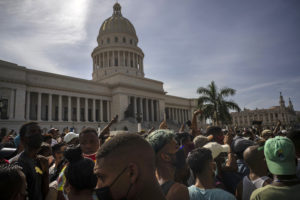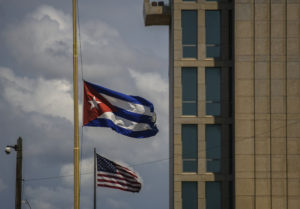Washington, DC—On March 2, the U.S. State Department announced it would maintain minimum staffing levels at the U.S. Embassy in Havana, Cuba. The U.S. government withdrew non-essential personnel and families of diplomats in September 2017, citing concerns over “sonic attacks” that were reportedly afflicting U.S. foreign service officers. Since then, the FBI has conducted a thorough investigation visiting the island several times and, according to press reports, has found no evidence of “sonic attacks”.
According to the research and advocacy group the Washington Office on Latin America (WOLA), given the findings of the FBI, it makes little sense to turn the U.S. Embassy in Havana into an unaccompanied post when U.S. diplomats are not facing clear and obvious physical dangers in Cuba.
“U.S. authorities should keep treating the medical issues that some foreign service personnel reported experiencing. Meanwhile, the FBI should continue working to get to the bottom of this medical mystery, along with other agencies that could provide valuable help such as the Centers for Disease Control and Prevention or the National Institutes of Health,” said WOLA Vice President of Programs Geoff Thale. “However, given that Raul Castro is stepping down on April 19, Cuba is about to enter a historic period of transition. Now is not the time to have bare-bones staffing at the U.S. Embassy in Havana. This means few U.S. diplomats will be on the ground when, for the first time since the Cuban revolution, someone who is not a Castro will assume the presidency.”
In the past, unaccompanied posts have typically been maintained in regions where U.S. foreign service personnel have faced high levels of obvious, physical threats. While the U.S. State Department does not maintain a public list of these posts, according to a 2010 article in the department’s official magazine, unaccompanied posts, as well as posts that strictly limit the presence of diplomat families, included Baghdad, Iraq; Kabul, Afghanistan; four cities in Pakistan; Juba, South Sudan; N’Djamena, Chad; Pristina, Kosovo; Beirut, Lebanon; Khartoum, Sudan; Sana’a, Yemen; and Algiers, Algeria.
“This hurts our ability to provide consular services to U.S. visitors to Cuba, and to those in the United States who want to engage with medical and scientific research, with Cuban academics, or with the Cuban private sector,” said Thale. “It makes it almost impossible to provide visas to Cubans who want to see their family in the United States. This decision implies that Havana is just as dangerous to U.S. diplomats as unaccompanied posts like Kabul, Baghdad, and Yemen, which is ridiculous. This decision is a damaging setback to U.S.-Cuba engagement, and it doesn’t serve the interests of the U.S. government, of U.S. citizens, or of the Cuban people.”
Contact:
Kristel Mucino
Vice President of Communications
E-mail: press@wola.org
Cell: 617-584-1713


